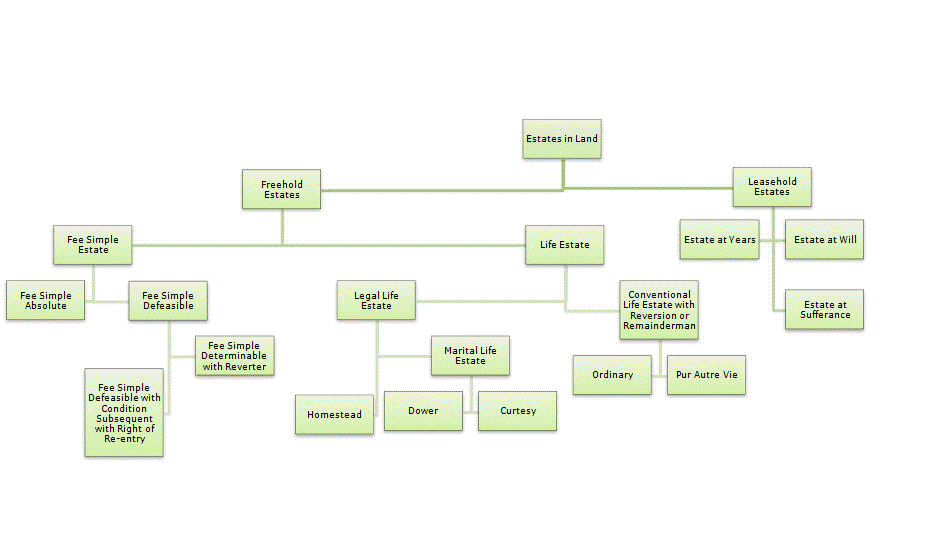Rights with Real Property

By Jose Cruz
Every single individual has public rights that exceed any private individual right. The rights that an individual has over real property include air, surface, and subsurface rights. Estates are also rights associated with real property. They are categorized as either freehold or leasehold estates. Real property refers to the land and its improvements. It includes all the physical aspects of real estate (Diaz and Hansz 172). This could be the walls, ceiling and anything that is attached to the land. “Land, in its general usage, includes not only the face of the earth but everything of a permanent nature over or under it. This includes structures and minerals” (Real Property). Individuals gain private rights by having ownership over real estate which is term real property.


"Cuius est solum, ejus est usque ad caelum et ad inferos":
"To whomever owns the land, shall own the earth to its center and up to the heavens."
This Latin phrase can be used to explain the air, surface, and subsurface rights related with real property (Duhaime). Air rights are the rights of the ownership and the use of the space above the land. Ideally they extend to outer space but it only extends to a “reasonable height”. This allows for air planes to fly over properties without the need to ask for permission. Subsurface rights are the rights of the ownership and the use of the space below the land. Just like air rights, they extend to center of the earth but really only extend to a “reasonable depth”. Modern technology does not allow us to reach the center of the earth to use that space. Surface rights are the rights of the ownership, use, and occupation of the surface land area in a real estate property (Diaz and Hansz 172-173). These rights are restricted by technology, mining, electricity distribution, sewer systems disposal and air travel. They create limits to the use of space and don’t provide the owner full ownership and usage of that space (Duhaime). According to U.S. Code Title 49 (a) Sovereignty and Public Right of Transit, the “U.S. Government has exclusive sovereignty of airspace of the United States and a citizen of the United States has a public right of transit through the navigable airspace”. According to U.S. Code Title 49 (b) Use of Airspace, the “Administrator of the Federal Aviation Administration shall develop plans and policy for the use of the navigable airspace and assign by regulation or order the use of the airspace necessary to ensure the safety of aircraft and the efficient use of airspace” (49 USC § 40103). However, the owner can be compensated by selling the right or leasing the right.
Freehold estates are ownership for an indefinite period of time. Most real estate bought are freehold estates. The freehold estates include fee simple absolute, qualified fee, life estates, and legal life estates. Fee simple absolute are inheritable and lasts as long as the individual and his heirs wants to keep it. Qualified fee is a qualification on the fees simple interest. Life estate is where the individual retains possession of the land for the duration of his or her life. Legal life estate is established by law rather than by owner of the land (Spaulding). Non-freehold estates are property interests with limited duration, also known as leasehold estate. They include tenancy for a stated period, tenancy at will, tenancy from period to period, and tenancy at sufferance (Diaz and Hansz 179). Concurrent estates exist when property is owned or possessed by two or more individuals simultaneously (Real Property).
The rights associated with real property are needed to protect the property and provide the owner with ownership and usage. The rights might have limitation but without them people would struggle to protect and use their land.
"49 USC § 40103 - Sovereignty and Use of Airspace." 49 USC § 40103. 30 Jan. 2012. Web. 12 Apr. 2012. <http://www.law.cornell.edu/uscode/text/49/40103>.
Diaz, Julian, and J. Andrew. Hansz. Real Estate Analysis: Environments and Activities.
Duhaime, Lloyd. "Air, Water and Subsurface Rights." Duhaime.org. Permalink, 04 June 2009. Web. 12 Apr. 2012. <http://www.duhaime.org/LegalResources/RealEstateTenancy/LawArticle-66/Air-Water- and-Subsurface-Rights.aspx>.
"Real Property." LII. 19 Aug. 2010. Web. 12 Apr. 2012. <http://www.law.cornell.edu/wex/real_property>.
Spaulding, WIlliam C. "Estates in Land." : The Fee Simple Estate and the Life Estate. Thismatter.com, 2011. Web. 12 Apr. 2012. <http://thismatter.com/money/real- estate/estates-in-land.htm>.
